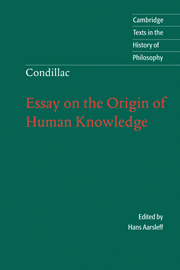Book contents
- Frontmatter
- Contents
- Acknowledgments
- List of abbreviations
- Introduction
- Chronology
- Further reading
- Note on the text and translation
- Essay on the Origin of Human Knowledge
- Introduction
- PART I The materials of our knowledge and especially the operations of the soul
- Section 1
- Section 2 Analysis and generation of the operations of the soul
- Section 3 Simple and complex ideas
- Section 4
- Section 5 Abstractions
- Section 6 Some judgments that have been erroneously attributed to the mind, or the solution of a metaphysical problem
- PART II Language and method
- Index
- Cambridge texts in the history of philosophy
Section 5 - Abstractions
Published online by Cambridge University Press: 05 June 2012
- Frontmatter
- Contents
- Acknowledgments
- List of abbreviations
- Introduction
- Chronology
- Further reading
- Note on the text and translation
- Essay on the Origin of Human Knowledge
- Introduction
- PART I The materials of our knowledge and especially the operations of the soul
- Section 1
- Section 2 Analysis and generation of the operations of the soul
- Section 3 Simple and complex ideas
- Section 4
- Section 5 Abstractions
- Section 6 Some judgments that have been erroneously attributed to the mind, or the solution of a metaphysical problem
- PART II Language and method
- Index
- Cambridge texts in the history of philosophy
Summary
§I We have seen that abstract notions are formed by ceasing to think of the properties by which things are distinguished in favor of thinking only of the qualities in which they agree. Once we stop considering what makes something extended to be such, or a whole to be such, we will have the abstract ideas of extension and of a whole.
Thus ideas of this kind are merely denominations that we give to things when we consider them in light of their resemblance; that is why they are called “general ideas.” But it is not sufficient to know their origin; there are also important considerations that bear on their indispensability and on the disadvantages that surround them.
§2 General ideas are without doubt absolutely indispensable. Since people are obliged to talk about things as being either different or alike, it became necessary to refer things to classes that were distinguished by signs. By this means they comprise in a single word what could not without confusion have been contained in a long discourse. There are evident examples in the use we make of such terms as “substance,” “mind,” “body,” “animal.” If we wish to speak of things merely as in each of them we see a subject that supports its properties and modes, all we need is the word “substance.”
- Type
- Chapter
- Information
- Condillac: Essay on the Origin of Human Knowledge , pp. 92 - 100Publisher: Cambridge University PressPrint publication year: 2001

